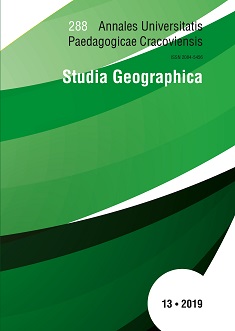Institutions and organizations influencing the development of wildlife tourism
DOI:
https://doi.org/10.24917/20845456.13.2Keywords:
institutions and organizations; motives for tourism; forest areas; wildlife tourism.Abstract
The development of tourism can be intensified with the close cooperation of many institutions and organizations. Wildlife tourism is a form of tourism organized in forest areas. This form of recreation creates opportunities for an activation of many institutions, and economic units, as well as areas with a particularly high level of afforestation. Forest areas have unique and one of its kind tourist values, which should be used by society. Therefore, efficient institutions and organizations should effectively support its development. Wildlife tourism, as a form of rest and recreation, should be promoted and dynamically developed. At the same time, promotion measures must be carefully selected. The aim of the study is to present dominant institutions and organizations that support the development processes of sciences and determine their role and importance in the organizational system. The article’s study uses specialist literature and observation method.
References
Commons, J.R. (1934). Institutional Economics. New York: Macmillian.
Chmielewska-Gill, W. (1998). Procesy dostosowawcze w sferze instytucjonalnej polskiego rolnictwa. W: Integracja polskiej wsi i rolnictwa z Unią Europejską, Wspólna polityka rolna, Fundusze strukturalne. Warszawa: FAPA.
Centrum Informacyjne Lasów Państwowych. Warszawa: 2014.
Europejski Fundusz Rolny na Rzecz Rozwoju Obszarów Wiejskich (Dz. U. nr 64, poz. 427).
Gaworecki, W.W. (2010). Turystyka. Warszawa: PWE.
Griffin, R.W. (2004). Podstawy zarządzania organizacjami. Warszawa: PWN. Internetowy System Aktów Prawnych (Dz. U. z 2011 r. nr 12, poz. 59).
Kłodziński, M., Wilkin J. (1998). Rozwój obszarów wiejskich w Polsce. W: Identyfikacja priorytetów w modernizacji sektora rolno-spożywczego w Polsce. Warszawa: Wyd. FAPA.
Kotarbiński, T. (1969). Traktat o dobrej robocie. Wrocław–Warszawa–Kraków: Ossolineum.
Michałowski, K., Łagowska, B. (2007). Wybrane elementy turystyki wiejskiej ze szczególnym uwzględnieniem turystyki i rekreacji na obszarach zalesionych. W: M. Jalinik (red.), Rozwój turystyki na obszarach wiejskich. Białystok: Wyd. Politechniki Białostockiej.
Muszyńska, B. (2000). Walory zdrowotne zbiorowisk leśnych. W: K. Pieńkoś(red.), Problemy turystyki i rekreacji w lasach Polski. Komisja Inżynierii Leśnej i Gospodarki Wodnej, Warszawa: Wyd. PTL.
North, D.C. (1990). Institutions, Institutional Change and Economic Perfomance, New York: Cambridge University Press.
North, D.C. (1991). Institutions, Journal of Economic Perspectives, 5.
North, D.C. (1994). Economic Performace Through Time, American Economic Review, 84.
Ossowska, M. (1958). Motywy postępowania. Warszawa: Książka i Wiedza.
Przecławski, K. (1996). Człowiek a turystyka. Zarys socjologii turystyki. Kraków: Albis.
Sikorski, Cz. (1988). Projektowanie i rozwój organizacji i instytucji. Warszawa: PWE.
Wilkin J. (1995). Instytucjonalne zaplecze polskiego rolnictwa, jego stan i znaczenie w procesie integracji europejskiej. W: Problemy rolnictwa południowo-wschodniego regionu Polski w procesie integracji z rolnictwem krajów Unii Europejskiej. Rzeszów: Regionalny Ośrodek FAPA.
Włodkiewicz W. (1986). Prawo rzymskie. Warszawa: Słownik encyklopedyczny.
www.maskulinskie.bialystok.lasy.gov.pl/.../-/asset...-/pop_up?_
Downloads
Published
Issue
Section
License
The submission of a paper to be published is synonymous with an agreement to transfer the copyright free of charge from the author to the publisher. The author also agrees to permit the publisher to publish the paper in printed form, open access online form, digital library form and other digital platforms with which the publisher has or will have a publishing agreement. Furthermore, the author agrees to not limit the number of copies that may be printed or issued by the publisher. In the case of co-authored papers, it is assumed that the corresponding author is authorized to represent the remaining co-authors in this respect. Authors are requested to sign a copyright declaration.

